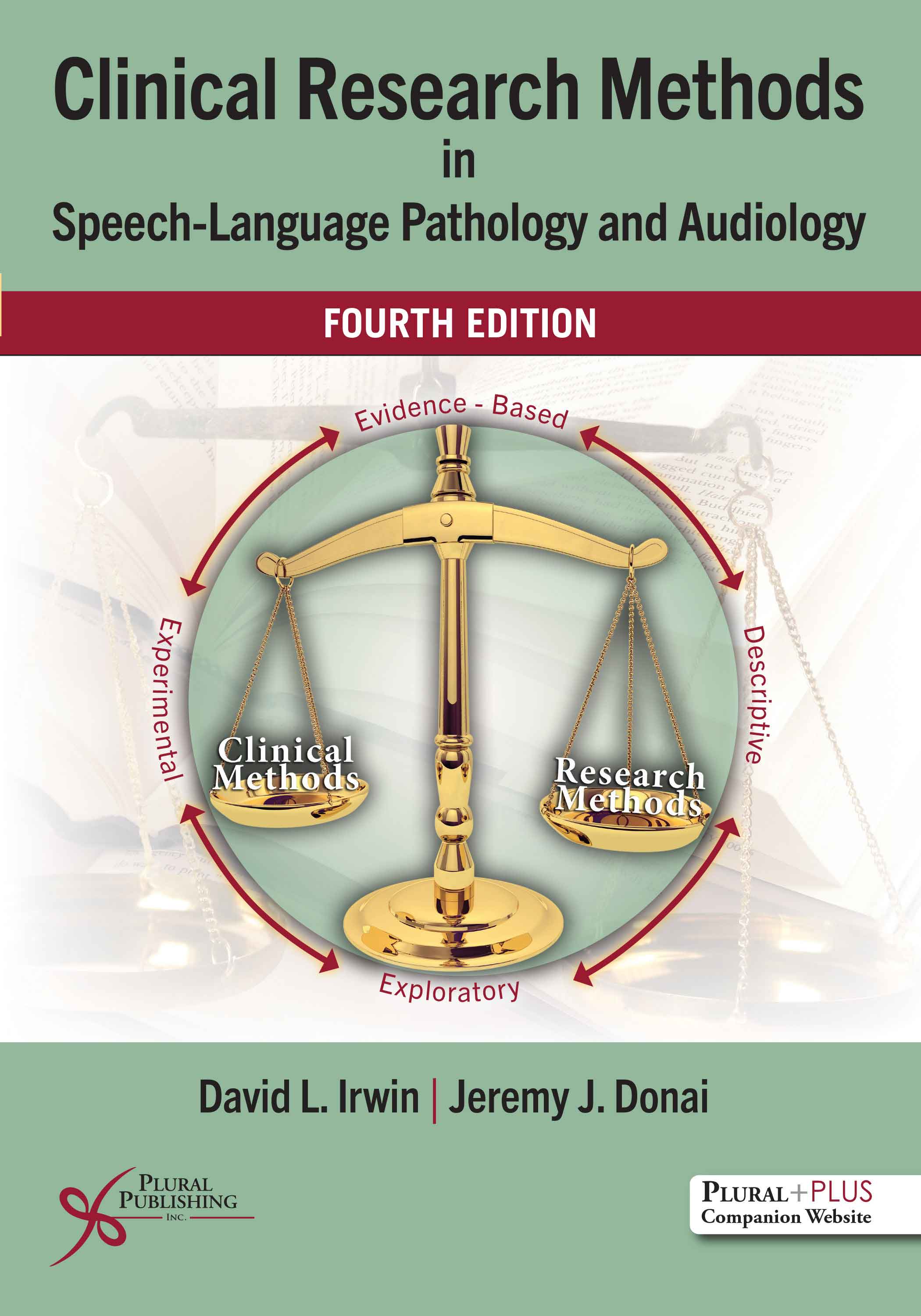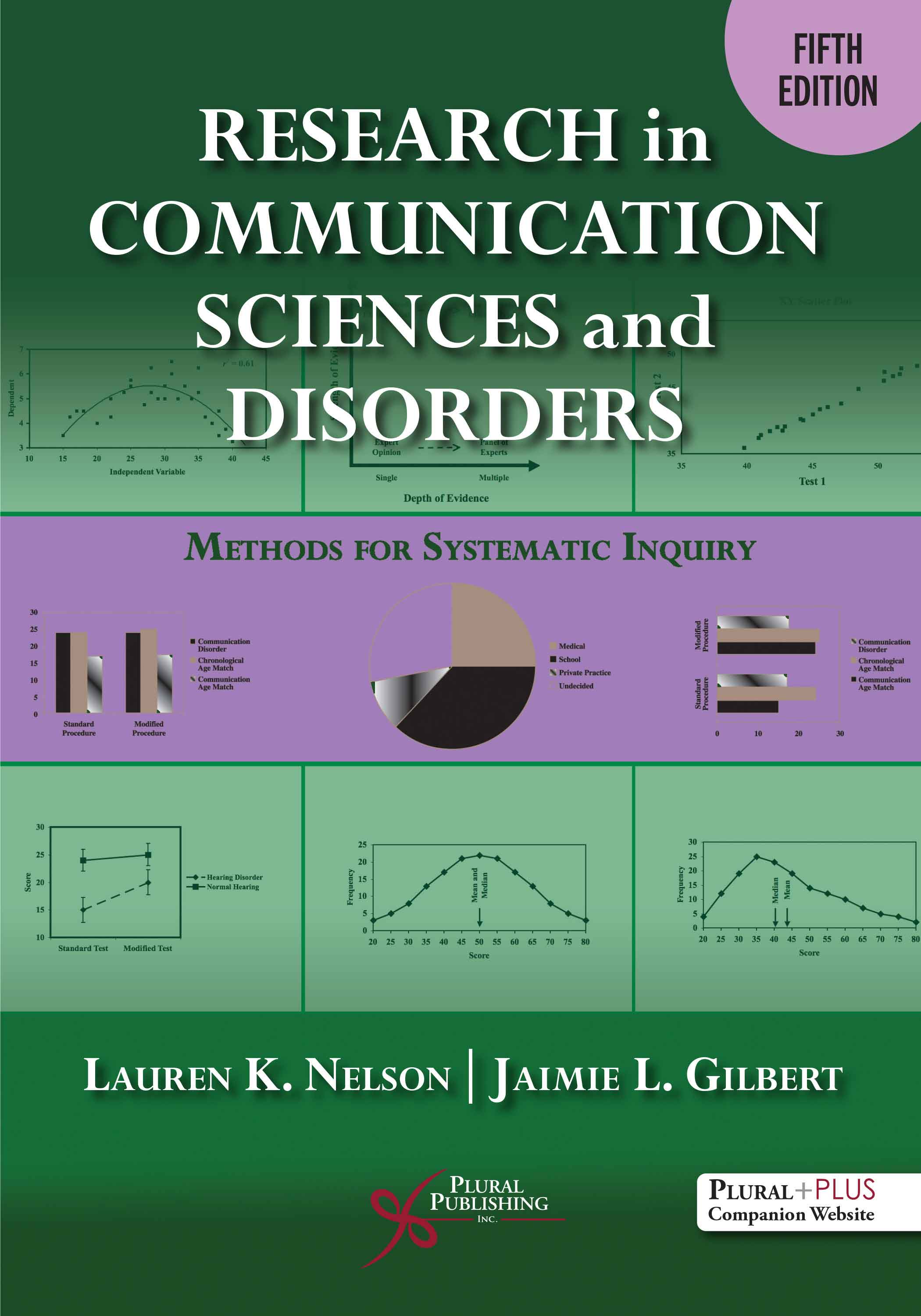
Clinical Research Methods in Speech-Language Pathology and Audiology
Fourth Edition
David L. Irwin, Jeremy J. Donai
Details: 355 pages, B&W, Softcover, 7" x 10"
ISBN13: 978-1-63550-722-5
© 2026 | Available
For Instructors
Purchase
With a new chapter on evaluating research articles, the fourth edition of Clinical Research Methods in Speech-Language Pathology and Audiology continues to be an essential resource for graduate students and clinicians seeking to understand the principles and methodologies involved with clinical research. As the demand for evidence-based practice continues to rise, understanding how to conduct and evaluate research becomes increasingly important in ensuring quality care and professional accountability.
This text emphasizes how to effectively apply research to clinical practice and decision-making processes. Readers will also gain knowledge of the significance of research ethics and the ethical considerations involved. With the utilization of discussion materials, this text will facilitate learning and critical thinking among students as they engage with the material.
This edition includes information on how to critically review both quantitative and qualitive articles. Current trends and updated examples from speech pathology and audiology literature will assist with real-world research situations.
New to the Fourth Edition
- New co-author, Jeremy J. Donai, PhD providing a fresh perspective
- New chapter on critically evaluating both quantitative and qualitative research articles
- Examples of integrating citations into a literature review
- Updated discussion of types of qualitative research currently being used, with additional and revised examples
- Expanded discussion of types of mixed method designs, with additional and updated examples
- Updated list of databases and sources for research in communication sciences and disorders
- Ancillary materials now include a test bank for instructors and study quizzes for students
Key Features
- Chapters begin with an outline of covered topics and learning objectives
- End-of-chapter discussion questions aid students in applying concepts
- A comprehensive glossary allows students to easily find and define important terms
- Numerous references throughout, including many ASHA and AAA Codes of Ethics
PluralPlus Online Ancillaries
For instructors: PowerPoint Slides, Test Bank
For students: Quizzes
List of Tables
List of Figures
About the Authors
Preface
Contributors
Acknowledgments
Chapter 1. Introduction to Research
Introduction
Importance of Research in Communication Disorders
Historical Evolution of Research in Communication Disorders
Sources of Knowledge
Types of Research
Descriptive Research
Cross-Sectional Research
Longitudinal Research
Semilongitudinal Research
Historical Research
Case Study Research
Secondary Analysis
Evaluation Research
Exploratory Research
Correlational Research
Case-Control Studies
Cohort Studies
Experimental Research
Randomized Controlled Trial
Quasi-Experimental
Sequential Clinical Trial
Single-Subject Designs
Meta-Analysis
Survey Research
Summary
Discussion Questions
References
Chapter 2. Ethics of Research in Speech-Language Pathology and Audiology
Need for Ethical Guidelines
Historical Background
Research Misconduct
Issues in Research Ethics
Planning Research
Confidentiality
The Health Insurance Portability and Accountability Act
Informed Consent
Deception
Institutional Approval
Control Groups
Conflict of Interest
Mentoring
Documentation
Referencing Sources
Copyright
Authorship
Peer Review
Publication Correction
Evidence-Based Practice
American Academy of Audiology
American Speech-Language-Hearing Association
Sanctions for Ethical Misconduct
Institutional Review Board
Teaching Research Ethics
Content
Methods
Current and Future Issues
Summary
Discussion Questions
References
Chapter 3. Research Problems
Basic Concepts and Terms
Control of Variables
Selecting a Topic
Selecting a Research Problem
Hypotheses and Theories
Feasibility of a Research Project
Budgetary Considerations and Preparation
Summary
Discussion Questions
References
Chapter 4. Locating, Accessing, and Assessing Information
Anne Marie Sisk and David Irwin
Introduction
Locating Information
Databases
Data Mining
Online Journals
Use of the World Wide Web
Interlibrary Loan
Manual Searches
Social Media
Evaluating Research
Rating the Evidence
Levels of Evidence
Critical Appraisal
Summary
Discussion Questions
References
Chapter 5. Literature Review
Organizing Literature Reviews
Background Literature Reviews
Formulating Questions for Literature Reviews
Narrative Reviews
Systematic Reviews
Differences Between Narrative and Systematic Reviews
Meta-Analysis
Best-Evidence Synthesis
Clinical Practice Guidelines
Summary
Discussion Questions
References
Chapter 6. Measurement
Scales of Measurement
Nominal Level of Measurement
Ordinal Level of Measurement
Interval Level of Measurement
Ratio Level of Measurement
Validity of Measurement
Reliability of Measurement
Summary
Discussion Questions
References
Chapter 7. Research Design and Strategy
Introduction
Characteristics of a Good Design
Group Design
Between-Subjects Designs
Within-Subjects Designs
Mixed-Group Designs
Advantages and Disadvantages of Group Designs
Single-Subject Designs
Sequential Clinical Trials
Technologic Applications and Research Designs
Summary
Discussion Questions
References
Chapter 8. Quantitative Research
Characteristics of Quantitative Research
Advantages and Disadvantages of Quantitative Research
Quantitative Research Designs
Nonexperimental Designs
Preexperimental Designs
Quasi-Experimental Designs
True Experimental Designs
Single-Subject Designs
Quantitative Analysis
Descriptive Statistics
Shapes of Distributions
Central Tendency
Variability
Bivariate Descriptive Statistics
Correlation
Inferential Statistics
Hypothesis Testing
One- and Two-Tailed Tests
Parametric and Nonparametric Statistics
Between- and Within-Subjects Tests
Steps in Hypothesis Testing
Evaluating Inferential Statistics
Multivariate Statistics
Meta-Analysis
Summary
Discussion Questions
References
Chapter 9. Qualitative Research
Characteristics of Qualitative Research
Issues in Qualitative Research
Qualitative Research Designs
Case Study
Ethnography
Phenomenology
Grounded Theory
Conversation Analysis
Data Collection Procedures
Observation
Interviewing
Focus Groups
Analyzing Qualitative Data
Validity and Reliability
Criteria for Evaluation of Qualitative Research
Summary
Discussion Questions
References
Chapter 10. Multimethod Research
Characteristics of Multimethod Research
Advantages and Disadvantages of Multimethod Research
Sequencing
Research Designs
Examples of Multimethod Designs
Evaluating Multimethod Research
Summary
Discussion Questions
References
Chapter 11. Reporting and Disseminating Research
Reasons for Reporting Research
Myths and Facts About Research Reports
Time Management for Reporting Research
Procrastination
Some Simple Rules for Dissemination of Research
Format of Research Reports
Abstracts
Key Words (Indexing Terms)
Author Contributions
Tables and Figures
Diagrams and Maps
Writing Styles
APA Format
References
Personal Pronouns
Avoid Bias
Permissions
Rewriting and Revising
Translating Research Reports to Published Papers
Types of Research Reports
Journal Articles
Selecting a Journal
Theses and Dissertations
Textbooks
Presentations at Professional Meetings
Oral Reports
Poster Presentations
Visual Supplements
Evaluating and Reviewing Research Reports
CATs
Summary
Discussion Questions
References
Chapter 12. Evaluating Tests and Treatments
Evaluation Issues
Tests
Treatment
Summary
Discussion Questions
References
Chapter 13. Evidence-Based Practice: Application of Research to Clinical Practice
Defining Evidence-Based Practice
Evidence-Based Practice: Terms and Definition
Research Utilization
Information Literacy
Clinical Trials
Advantages and Disadvantages of Evidence-Based Practice
Myths About Evidence-Based Practice
Barriers to Evidence-Based Practice
Quality of Evidence: Levels and Grades of Evidence
Knowledge and Skills Needed for Evidence-Based Practice
Developing and Implementing Evidence-Based Practice
Organizational Support for Evidence-Based Practice
Resources for Evidence-Based Practice
Communicating Evidence
Ethical Considerations
Control Groups
Double Blinding
Risks and Benefits
Fidelity
Summary
Discussion Questions
References
Chapter 14. Critical Review of Quantitative and Qualitative Research Articles
Tobias A. Kroll and Jeremy J. Donai
Consumers of Research
General Critical Review Strategies: Quantitative Articles
Introduction
Methods
Results
Discussion/Conclusion
General Critical Review Strategies: Qualitative Articles
Introduction and Literature Review
Methods and Results
Discussion/Conclusion
Critical Review (Quantitative)
Introduction
Methods
Results
Discussion/Conclusion
Summary
Critical Review (Qualitative)
Reviewing an Autoethnographic Study
An Overview of Hinckley (2005)
Evaluating Hinckley (2005)
Reviewing a Formal Ethnography
An Overview of Azios et al. (2018)
Evaluating Azios et al. (2018)
General Summary
Discussion Questions
References
Chapter 15. Research Grants
Introduction
The Grants Acquisition Process
Grant Seeking
General Principles of Grant Seeking
Grant Proposal Writing
Preliminary Considerations
The Grant Proposal
The Budget
The Idea or Problem
Unsolicited and Solicited Proposals
Basic Principles of Grant Proposal Writing
Suggestions for Grant Proposal Writing
Characteristics of a Fundable Research Grant Proposal
The Grant Proposal Review Process
Grant Management
Summary
Discussion Questions
References
Glossary
Index
Clinical Research Methods in Speech-Language Pathology and Audiology, Fourth Edition comes with access to supplementary student and instructor resources on a PluralPlus companion website.
The companion website is located at: https://www.pluralpublishing.com/publication/crmslpa4e
STUDENTS:
The student resources include study questions.
To access the student resources, you must register on the companion website and log in using the access code located in the front of your textbook.
INSTRUCTORS:
The instructor resources include PowerPoint slides and a test bank. You will also have access to all of the student resources listed above.
To access the instructor resources, you must contact Plural Publishing, Inc. to be verified as an instructor and receive your access code.
Email: instructormaterials@pluralpublishing.com
Tel: 866-758-7251 (toll free) or 858-492-1555
*Note for students: If you have purchased this textbook used or have rented it, your access code will not work if it was already redeemed by the original buyer of the book. Plural Publishing does not offer replacement access codes for used or rented textbooks.

Research in Communication Sciences and Disorders: Methods for Scientific Inquiry
Fifth Edition
Lauren K. Nelson, Jaimie L. Gilbert
Details: 309 pages, B&W, Softcover, 7" x 10"
ISBN13: 978-1-63550-702-7
© 2026 | Available


